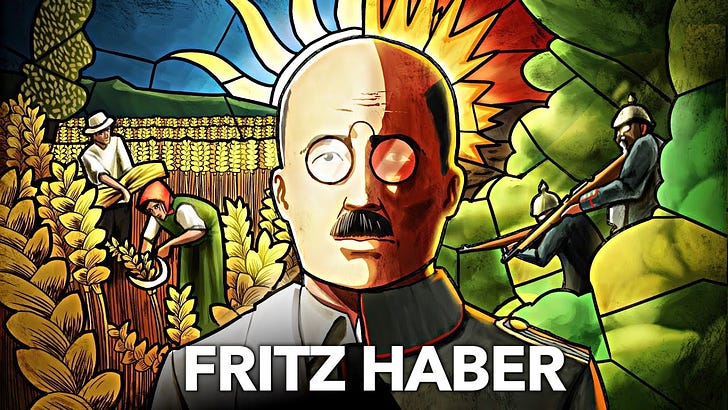THG Recom. 14: how they tried to save humanity but ended up endangering all of us
A tale of Chemical fertilizers, explosives, TEL & CFCs plus podcast on climate crisis and two films
Given that COP 27 is at the verge of achieving almost nothing compared to what the countries have to do to avoid climate collapse, it is worth revisiting the story of how we reached here: how we got here, how missed or downplayed the danger signals earlier and how greed has always threatened human civilization.
In this episode of the Cautionary Tales aptly titled ‘The inventor who almost ended the world, Tim Harford elaborates how the devastating outcomes of inventions could be anticipated even if not intended. Failure to do so, aided by unsatiable greed of corporations has cost us millions of lives. And yet, we are all set to repeat that history with global heating.
Thomas Midgley's inventions caused his own death, hastened the deaths of millions of people around the world, and very nearly extinguished all life on land.
Midgley and his employers didn't set out to poison the air with leaded gasoline or wreck the ozone layer with CFCs - but while these dire consequences were unintended... could they have been anticipated?
Here is another video story on how humankind solved one set of problems with chemical fertilizers while creating another set:
Moral of the story: do not move ahead of yourself in thinking that human mind can solve all the problems in the world.
Want to listen to a thoughtful converstaion reflecting on the ways out of the climate morass we are in rather than doom-scrolling? Here is just that, in an episode of Ezra Klein Show:
Bill McKibben on the Power That Could Save the Planet
To those familiar with the climate movement, McKibben is a familiar name. His book “The End of Nature” has been compared to Rachel Carson’s “Silent Spring” in terms of its impact on the climate movement. He’s founded organizations like Third Act and 350.org, the latter of which is among the largest climate activist organizations in the world today. He was a key leader in the fight to block the Keystone XL pipeline. And he currently writes the influential newsletter “The Crucial Years.” Ask anyone in the climate movement today about their inspirations and McKibben will almost certainly top the list.
But in McKibben’s telling, the climate movement’s successes in getting us to this point actually require it to change. A movement founded on blocking bad things from happening now needs to turn to building at intensified speed; a movement that has long fought to preserve the natural world now has to help usher in a wholesale transformation of the global landscape; a movement that has long been critical of capitalism and economic growth now has to align itself with those forces in order to achieve its ends.
Those shifts will require new tactics, new animating ideas, new motivations and new priorities — with the future of the climate hanging in the balance. So I wanted to have McKibben on the show to talk about this dawning era of the climate fight we’re entering, and what changes the movement will have to make to meet this moment.
Finally, few worthy movies for ‘election holiday’ in Nepal:
In festivalscope, Nepal-EU Film Festival is still going on. I strongly recommend this poignant tale of two kids whose mother slits her wrist to avoid deportation from Austria to Chechnya:
Oskar and Lilli: Where No One Knows Us by Arash T. Riahi
For those of you in India, the month-long EU Film Festival in India has also just started.
Here is one more short film:



